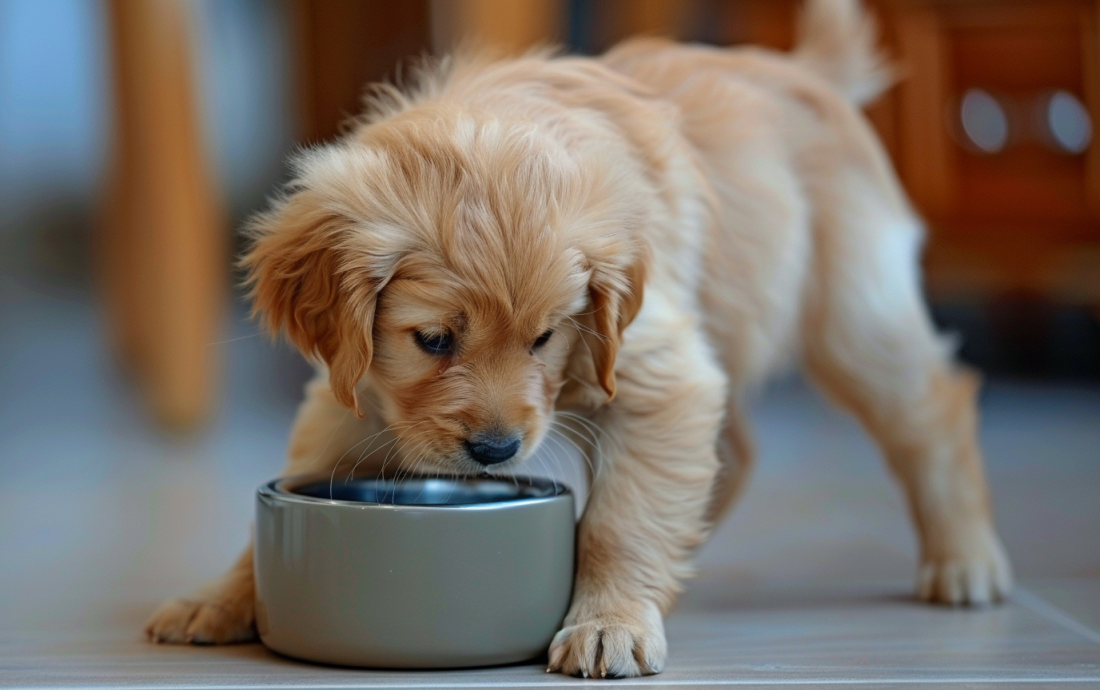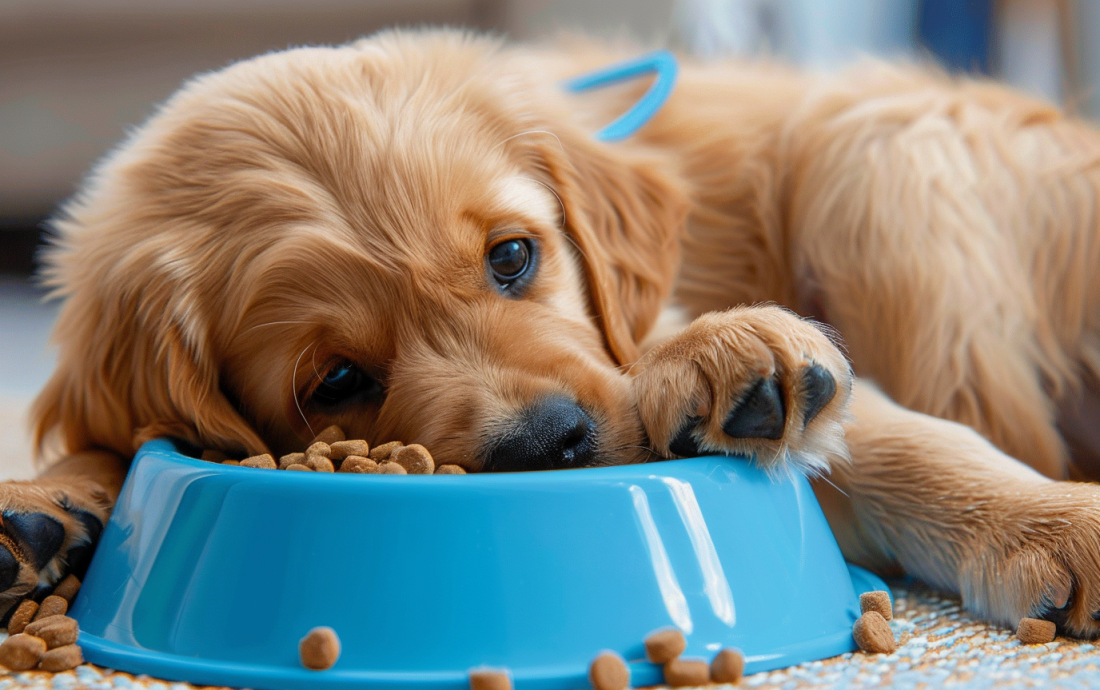Have you ever caught yourself gawking at your dog while it sucks in breakfast, wondering how on this earth can it still be hungry? Or maybe your puppy is the opposite, an obnoxiously finicky eater who scarcely touches its bowl. Whether you have a furry vacuum cleaner or a dainty nibbler on your hands, coming up with the perfect feeding plan for your pet is crucial!
Significance of Schedule
A consistent feeding schedule, however, goes beyond those pleading eyes (although that is also relevant!). It is vital for his canine’s well-being and health. Consider this – routine meals help to keep digestion smooth, prevent energy fluctuations and even influence their behaviour. A dog that knows when he will eat next will not beg so much; neither will he whine and scavenge.

Individual Needs
But here’s the thing: there isn’t one “correct” answer to “how many times should a dog eat per day?” Dogs like us have different needs according to several factors. That’s where we come in – we’re diving into everything involved in creating the best possible schedule for your little fur baby.
Introduction
Now you may be asking yourself why I know anything about dogs’ dietary requirements. It’s a fair question! I am Karyn; I have loved dogs all my life and have had years of experience looking after mine own dogs . But most importantly, this information isn’t just based on personal opinion – it’s supported by solid veterinary advice and reputable sources.
Factors Affecting Dog Feeding Schedule
Age: Your Dog’s Life Stage Matters
Think of your pup’s eating habits as fashion choices – they change over time! Here is what you need to know about each stage of life:
Puppies: The Frequent Feeders
Puppies require much fuel because they are cute little eating machines due to their small tummies and super-fast metabolism! Almost all puppies will need 3-4 meals every day, especially in the early weeks. As they grow, you will start reducing the meals.
Adults: The Twice-a-Day Champs
For most grown-up dogs, two evenly spaced out meals per day works best (think breakfast and dinner for us). Some dogs, such as those that are smaller or have more energy, might do better with three smaller meals a day.
Seniors: Adjusted Appetites
As our dogs age, their metabolism slows down and activity levels could change too. This necessitates changing their feeding pattern. A few senior pets require tiny frequent feeds to keep them comfortable when digesting food. You should always ask your vet since older canines could have underlying health issues.
Breed Size: Big Dogs vs. Tiny Tots
Do you know that a Chihuahua and Great Dane have significantly different feeding requirements? It all comes down to body size and metabolism:
Smaller Breeds: The Mighty Metabolisms
Small breeds tend to burn energy faster; hence they can crash if left without food for long time periods. Think of them like tiny hummingbirds that need constant fuel supply. Usually this means little dogs having about 3-4 meals every day so that their blood sugar never goes too low.
Larger Breeds: Slow and Steady
Our bigger puppies typically have slower metabolisms. Although two meals per day will usually suffice, be careful not to overfeed them. Big dog breeds are more susceptible to bloat, which can be life-threatening. Talk to your vet about preventing bloat in your big buddy.
Activity Level: Busy Bees vs. Couch Potatoes
Is your dog a non-stop athletic machine that is always ready to go for the ball or a run or just play? Or are they more into napping and soaking up the sun? Their level of activity affects their food intake requirements.
Highly Active Dogs:
Those puppies who spend their days hiking, swimming, or just generally bouncing off the walls might require a few more calories to keep their energy levels up thereby meaning slightly larger meals or an extra feeding throughout the day.
Couch Surfers:
If your dog’s idea of exercise is walking slowly towards the food bowl, he may need less calories overall. It is important to watch their weight and adjust food portions so they don’t gain too much.
Health Considerations: When Special Diets are Key
Sometimes our dogs need some extra attention when it comes to what time they eat etc… There are certain medical conditions which will determine how often and what your dog eats. For example,
- Diabetes: Dogs with diabetes may require special meal times that coincide with insulin injections.
- Digestive Issues: Smaller, more frequent feedings could help dogs with sensitive stomachs digest better.
- Other Conditions: Many health problems including kidney disease and food allergies call for a specialized diet plan.
The Veterinarian is Your Best Friend!
In case there is any health condition affecting your pet consult extensively with the vet so as to come up with right nutritional plans and schedules for him/her/it since they know how best you can make him/her/it healthy and happy at all times.
Debunking Myths and Addressing Common Concerns
Myth-Busting Time!
There are a lot of confusing things said about how we should feed our dogs. Let’s debunk some of these misconceptions once and for all:
Myth #1: “Puppies should be able to eat whenever.”
While it may seem like puppies are insatiable, free-feeding can lead to unhealthy eating habits and weight issues. This helps regulate their digestion so they do not get picky with food.
Myth #2: “Free-feeding is more natural for dogs.”
Dogs in the wild don’t actually have a buffet constantly available! They hunt and scavenge for meals, which means there are times when they eat and periods of not eating. In fact, mirroring this natural cycle by having regular mealtimes is better.
Myth #3: “Senior dogs always need less food.”
It depends! Some older dogs may become less active and have slower metabolisms that might require fewer calories. However, other elderly dogs could require extra nutrients if they have health problems. Consult your vet for the best advice.
Addressing Common Concerns
Let us take on some of those fears that dog owners face at night (or just sit around staring at their pet’s dish):
“My dog always seems hungry even after he has eaten!”
This could be due to many reasons; a growth spurt or slightly more calories needed due to increased activities or maybe an underlying medical condition. If you find that your dog is always ravenous then it is time to go to the vet’s office.
My dog is choosy about his food. How often should it be given?
Choosy dogs can be irritating! Therefore, the worst thing you can do is turn mealtimes into a constant game of “what will you eat today?”. Puppies fed at certain times of the day and leave the meal for around twenty minutes before removing it soon learn to plan their meals.
I’m concerned about bloating with my large breed dog. How can I change their feeding time?
Bloat is major! Besides giving smaller meals more frequently, there are other ways to lessen risks ranging from utilizing a slow-feeder bowl as well as avoiding exercise directly after eating. Consult your veterinarian.

Feeding Schedules for Different Dog Life Stages
So now that we have gone through all the important factors let us start putting them together. Remember, these are just general guidelines – make sure you consult your veterinarian for a more accurate meal plan for your particular dog!
Puppy Feeding Schedule:
8-12 weeks old puppies: These small animals require 3-4 feeds daily which are evenly spaced out; and later on this number decreases gradually as they grow big. Here is a sample schedule:
- Feed 1: 7 AM
- Feed 2: 12 PM
- Feed 3: 5 PM
- Feed 4:10 PM (if necessary)
Portion Control: According to your puppy’s food bag or by asking your vet about how much to feed per meal based on his weight and predicted adult size. Don’t forget to adjust their food intake as they grow!
Transition Time: In addition, if any new type of diet has been introduced then always make gradual switch over period so that stomach upset may not occur. As well when pups become older requiring lesser feeds, avoid making sudden changes.
Adult Feeding Schedule:
Majority of Adult Dogs – Most grown-up dogs thrive on two meals a day mostly breakfast and dinner for their owners some dogs may prefer three smaller ones like you know your dog.
Example Schedule (Two Meals):
- Feed 1: 7 AM
- Feed 2: 6 PM
Example Schedule (Three Meals):
- Feed 1: 7 AM
- Feed 2: 1 PM
- Feed3: 6 PM
Portion Control: Once more, follow the feeding recommendations on your dog’s food or talk to your vet about how much they should have.
Senior Feeding Schedule:
- Senior Snacks – So consult with your vet about what is best for your old pup. Some may need to follow the same schedule as in adult life whereas others would benefit from having several smaller feeds may be around three or four times daily.
- Health Considerations – A senior dog with health problems needs a specialized diet and feeding plan advised by the vet.
Speaking of nutritious treats, did you know some seeds are packed with vitamins and minerals that can boost your dog’s health? Learn about 6 Vet-Approved Seeds for Dogs: Boost Health & Happiness
Conclusion
There you go – an all-encompassing guide to creating the ideal mealtime schedule for your furry friend! Remember, it’s all about knowing your dog and working alongside your veterinary doctor. With a little forethought and consistent feeding habits, you can help ensure that man’s best friend lives a long, healthy life.
FAQs
Can my dog’s meal timing impact upon chances of separation anxiety?
This tackles one specific common concern directly linked back to our topic of feeding schedules.
My dog is fat – how do I change his/her eating time in order to help them lose weight safely?
This is highly relevant to many dog owners and frequently searched for, thereby increasing the likelihood of featuring it as a helpful resource.
Can medication affect my dog’s appetite or eating patterns?
A practical query likely to be sought and adds value to your content.

Healthy dogs mean happy dogs, and that makes me happy! I’m here to share all the tips for keeping your best furry friend in top shape, from puppyhood to their golden years.

